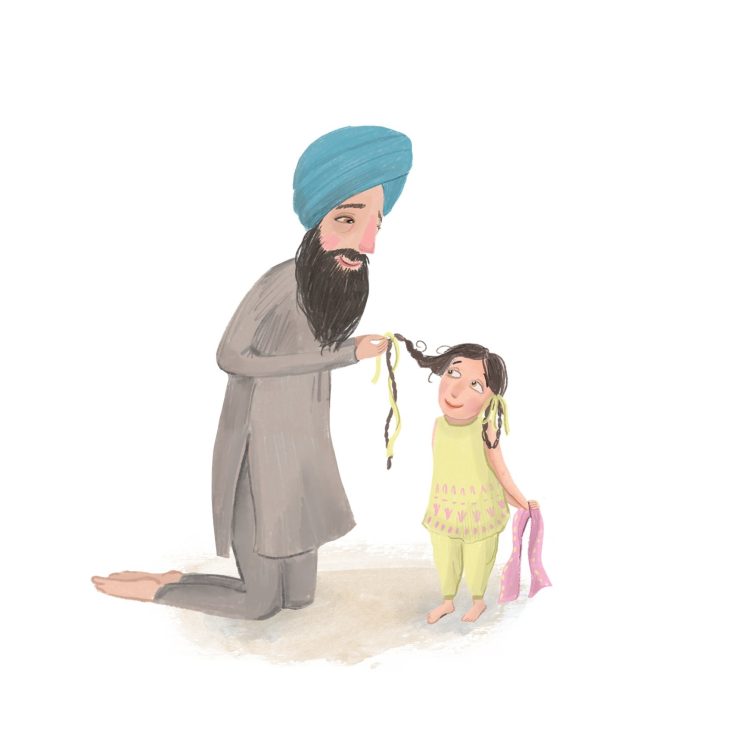Writing the Book I Wanted to Read
June 19, 2020

Simran Jeet Singh is a father, scholar, and activist based in New York City. He cares deeply about equity and justice, as well as his beloved San Antonio Spurs. You can find his work at @SikhProf (Twitter, FB, IG), and Fauja Singh Keeps Going.
I remember being in elementary school and thinking to myself that, if my classmates could just see characters in their book with turbans and beards and brown skin, then maybe – just maybe – it would help them see my family as more normal and less foreign.
But that never happened, and thirty years later, that still doesn’t happen.
After becoming a father to two young girls, I realized that no one else was going to write the book I wanted in this world. I also realized that unless I did, neither my girls nor their friends would ever encounter positive images of people who look like me.
I got to work on a new children’s book, a biography of Fauja Singh, the oldest person to ever run a marathon. He had been such an inspiration for me that he changed my life. I signed up for my first marathon the day he finished one at the age of 100. And I’ve never stopped running since.
That his story helps humanize Sikhs who are so often seen as threatening, villainous, and terroristic was only one of the many reasons I selected it. I believe that if kids can learn to see the humanity of those who look most different from them, then perhaps they can learn to see the humanity in everyone they encounter, including their own.
This belief led me to highlight some of his life experiences that help us all – children and adults alike – counter some of the stereotypes of what we imagine success to look like. I want our kids to see people who struggle with disability, poverty, illiteracy, racism, and ageism as people who are worthy of dignity and respect. It’s a lesson in inclusiveness and open-mindedness. And what better way to show them that than through storytelling?
Another reason Fauja Singh’s story spoke to me is that he has overcome a number of challenges in his life through hard work and perseverance: a disability that prevented him from going to school, never learning how to read or write to this day, losing his children and working through depression. Witnessing him overcome his own obstacles gives our kids the confidence that they can overcome the challenges that life throws their way.
I was fortunate to get the help of Supriya Kelkar to coach me through the process of drafting a children’s book and equally fortunate to catch the attention of Tanusri Prasanna a literary agent with Foundry Media. We wrote a proposal together and sent it to Namrata Tripathi, an editor we both admired who led Penguin Random House’s new imprint Kokila. Namrata liked the story enough and the rest was history.
Or so I thought.
The idea of publishing this book was exciting and consumed me, especially when I realized it would be the first-ever children’s book from a major publisher to center a Sikh story. We worked for more than two years on it before I got a set of proofs in the mail. It was upon opening the package in the mail and holding the prints in my hand – highlighted by the exquisite artwork of Baljinder Kaur – that it first felt real. At that moment, I was transported back to my childhood dream of seeing someone who looked like my family in a children’s book.
That evening, I sat down to read the book for the first time with my own family. My three-year-old squealed with joy when I turned to the page of Fauja Singh doing his daughter’s hair.
“Hey! That’s you and me every morning!”
My heart melted. She saw immediately what I had been dreaming of my whole life. This is what we mean when we say that representation matters.
Seeing herself and me as positive characters in a picture book confirmed for me what I had imagined. Representation also matters for marginalized folks because it can counter the negative messages all around us. It’s so sad to think about how all these kids – including my own daughter – know to think about people who look like me is what they see on television or in movies. And it hurts to think about how these messages will negatively impact how my daughters’ classmates will see me.
When they see me getting pulled aside for additional screening at the airport, or when they hear people whisper under their breath as I walk into a room, at least now, with this new children’s book, they will have another touchpoint of something positive to help round out their perspectives.
At a time when hate has been normalized and our children are susceptible to its toxicity, I can’t put into words how much it means to offer a small antidote through a story that instills compassion and understanding of those who are different from us. These are the values I want all of our kids to embody – mine and yours alike.
This article is printed with permission by Fathering Together and author Simran Jeet Singh. Fathering Together is a non-profit that supports individuals who identify as fathers to become better parents and people. They accomplish this through building community, providing learning experiences, increasing connection and communication with self and others, and empowering fathers to tell their stories. Simran’s reflection is part of a collection of stories published in Fathering Stories, an annual anthology of stories spanning birth, death, and all the adventures in between.
Share
Related Articles
American Civic Life
Racial Equity
Christian Writer Danté Stewart Seeks Revelation in Black Experience
American Civic Life
We Commemorate, We Commit: Out of Catastrophe, a Conversation on Connection and Repair



